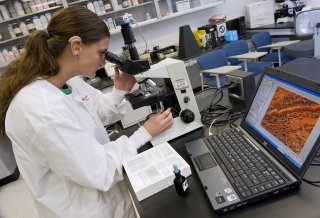You are here
Abbey Moreland

Abbey Moreland, 21, of Crystal, Mich., graduated with a bachelor’s degree in Biology at Rochester Institute of Technology. Her plan is to work with animals.
“I feel awesome about my major,” she says. “I decided to go into Biology because I love animals so much and they are easy to work with. I cannot wait to work with animals and prove that deaf people can do anything but hear.”
Diagnosed deaf when she was a year old, she prefers to use both spoken language and sign language to communicate. She attended a mainstreamed school with a program for deaf students prior to attending to college.
“I was used to having the same interpreter every day in high school,” she says. “I liked that because the interpreter could actually help me out when I had a presentation and I didn’t have to worry about them not understanding my signs.”
That changed in college, where she had different interpreters every day. “I think it is very important that I am assigned to an interpreter that I like and knows my background,” she says. “When it comes to a tough course, it does matter. The interpreter knows how my mind works and could convert words into a way where I can understand it. All interpreters have different styles of signing. I cannot understand ASL interpreters. I noticed that I do better in classes if the teacher signs themselves but not everyone can sign so that is another disadvantage.”
She says technology, including C-Print classroom captioning at RIT, and her hearing aids, have helped greatly. “If it weren’t for my hearing aids, I don’t think I would have been able to do as well in school.”
But one of the biggest struggles she’s found was the expense of going to college. She receives some financial aid, but wishes Vocational Rehabilitation offered more. “I can’t even buy books for the classes I need because I can’t afford it myself,” she says.
She hasn’t let those barriers stop her, nor the suggestions that she shouldn’t take on a heavy course schedule. Anything is possible with hard work and determination, she says.
“When I wanted to take 22 credits, I was told by many people not to do that but I did it anyway because I knew I could do it,” she says. “I ended up with a 3.6 GPA. I was very proud of myself. I am very confident and my family raised me to be very determined and ‘go big or go home,’ so I am always finding a way to get through it, not around it.”
Attitudes that assume deafness meant limitations helped her become determined to accomplish her goals early in her life. “When I was younger, people used to think that deaf kids can’t do much,” she says. “I raced motocross growing up and won the ice race nationals in 1998 at age 8. People were very shocked.”
Her advice for young deaf people seeking careers in science and technology: “Simply do your best to get through barriers, not around them. If you go around everything, it will hit you hard one day.”